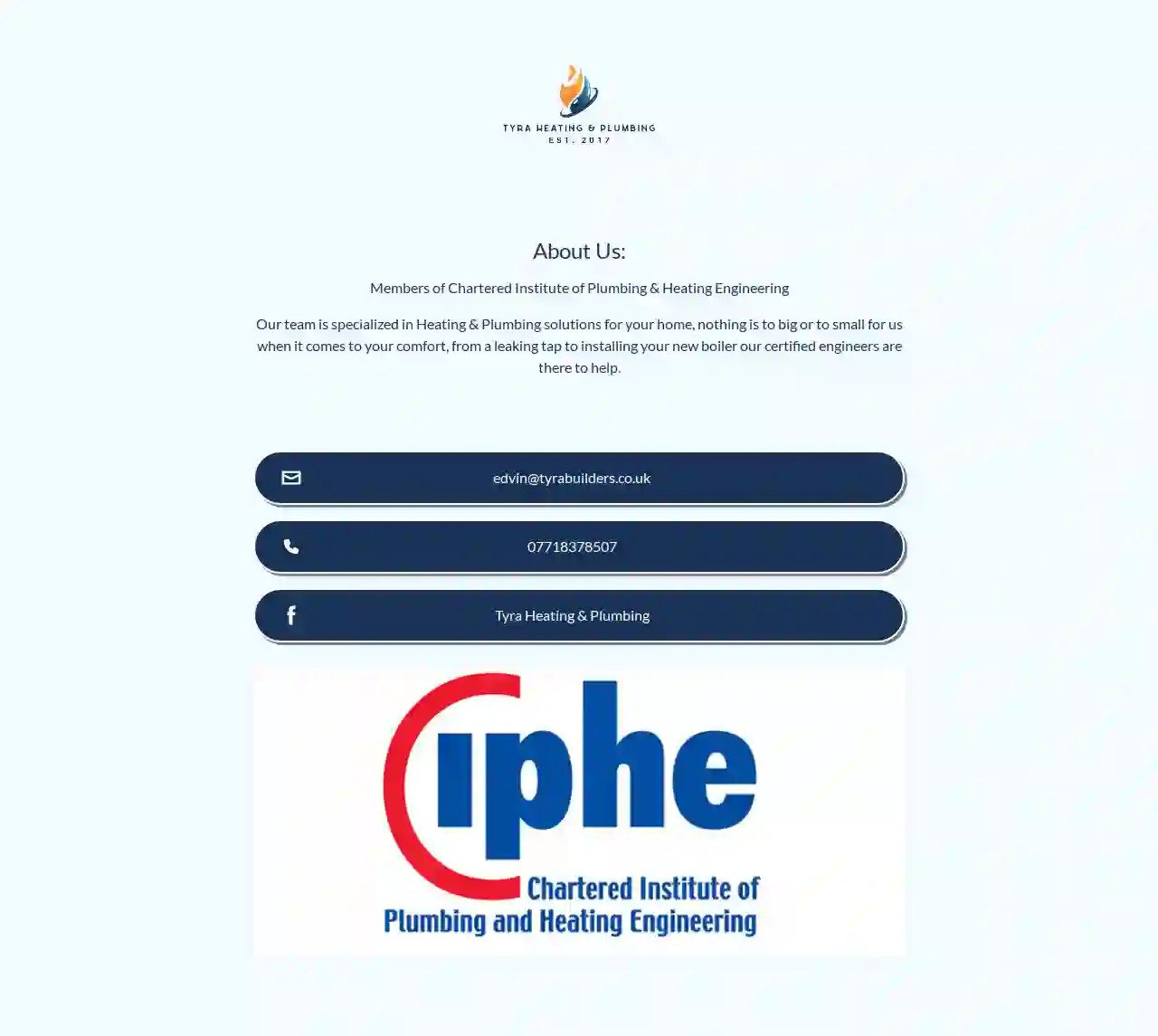Emergency HVAC Dunstable
Find Emergency AC Repair in Dunstable
Get 3 FREE Emergency HVAC Service quotes for your project today! Compare profiles, reviews, accreditations, portfolio, etc... and choose the best deal.
Service Needed
City or Town
- Wa
Watertight Mechanical Plumbing And Heating Ltd
1Dunstable, GB- Services
- Why Us?
Get Quote - du
dunstable plumber
4.54 reviewsDunstable, GB- Services
- Why Us?
Get Quote - Du
Dunstable Heating Engineers
1Dunstable, GB- Services
- Why Us?
Get Quote - Th
The Heating Company
1Dunstable, GB- Services
- Why Us?
Get Quote - M
M Moran plumbing and heating
1Dunstable, GB- Services
- Why Us?
Get Quote - M
M Callaghan plumbing and Heating Services
3.73 reviewsDunstable, GB- Services
- Why Us?
Get Quote - Wo
Wolseley Plumb
4.65 reviewsDunstable, GB- Services
- Why Us?
Get Quote - Se
Select Plumbing Ltd
42 reviewsDunstable, GB- Services
- Why Us?
Get Quote 
Tyra Heating & Plumbing
1Dunstable, GBTyra Heating & Plumbing is a team of certified engineers specializing in heating and plumbing solutions for your home. No job is too big or too small for us, from a leaking tap to installing your new boiler, we are here to help ensure your comfort.
- Services
- Why Us?
- Our Team
- Gallery
Get Quote- T
T Robinson Heating Plumbing & Gas
4.214 reviewsDunstable, GB- Services
- Why Us?
Get Quote
Over 16,895+ HVAC Companies onboarded
Our HVAC companies operate in Dunstable & beyond!
HVACCompaniesHub has curated and vetted the Best HVAC Businesses in Dunstable. Find the most reliable pro today.
Frequently Asked Questions About Emergency HVAC Services
Find answers to common questions about emergency HVAC repair and 24/7 heating and cooling services.
- Insulate Pipes: Insulate exposed pipes in unheated areas, such as crawl spaces, attics, and garages.
- Seal Air Leaks: Seal air leaks and cracks in walls and foundations near pipes.
- Keep Thermostat Consistent: Maintain a consistent thermostat setting, even when you are away, to keep indoor temperatures above freezing.
- Open Cabinet Doors: Open cabinet doors under sinks to allow warmer air to circulate around pipes.
- Let Faucets Drip: During freezing temperatures, allow faucets to drip slowly to relieve pressure and prevent pipes from bursting.
What is a dehumidifier, and do I need one?
A dehumidifier removes excess moisture from the air, improving indoor air quality and comfort, especially during humid summer months.. High humidity can lead to mold growth, musty odors, and respiratory problems. A dehumidifier can help to maintain comfortable humidity levels. You can use a portable dehumidifier for specific rooms or have a whole-house dehumidifier integrated with your HVAC system.
How can I prevent frozen pipes in the winter?
Frozen pipes are a common HVAC emergency in cold climates. Protect your pipes from freezing by:
How often should I replace my AC unit?
Air conditioners typically last around 15 years with proper maintenance. Older AC units are less efficient and more likely to break down. Replacing an old unit with a new, energy-efficient model can significantly lower your utility bills.
What is a humidifier, and should I use one with my HVAC system?
A humidifier adds moisture to the air, which can improve indoor air quality and comfort, especially during dry winter months.. Dry air can cause respiratory issues, dry skin, and static electricity. A humidifier can work with your HVAC system to maintain comfortable humidity levels throughout your home. If your HVAC system doesn't have a built-in humidifier, consult with a technician about having one installed.
What is a dehumidifier, and do I need one?
A dehumidifier removes excess moisture from the air, improving indoor air quality and comfort, especially during humid summer months.. High humidity can lead to mold growth, musty odors, and respiratory problems. A dehumidifier can help to create a healthier and more comfortable indoor environment. If you have high humidity levels throughout your home, consult with an HVAC professional about installing a whole-house dehumidifier.
How can I prevent frozen pipes in the winter?
Frozen pipes are a common HVAC emergency in cold climates. Protect your pipes from freezing by:
- Insulate Pipes: Insulate exposed pipes in unheated areas, such as crawl spaces, attics, and garages.
- Seal Air Leaks: Seal air leaks and cracks in walls and foundations near pipes.
- Keep Thermostat Consistent: Maintain a consistent thermostat setting, even when you are away, to keep indoor temperatures above freezing.
- Open Cabinet Doors: Open cabinet doors under sinks to help prevent pipes from freezing.
- Let Faucets Drip: During freezing temperatures, allow cold water taps to drip slowly to keep water moving and prevent freezing.
How often should I replace my AC unit?
Air conditioners typically last 15-20 years with proper maintenance. If your unit is getting old and inefficient, or if it requires frequent repairs, consider replacing it.
What is a humidifier, and should I use one with my HVAC system?
A humidifier helps prevent dry air. Dry air can cause respiratory issues, dry skin, and static electricity. A humidifier can work with your HVAC system to add moisture to the heated air throughout your home. If your HVAC system doesn't have a built-in humidifier, consult with a technician about having one installed.